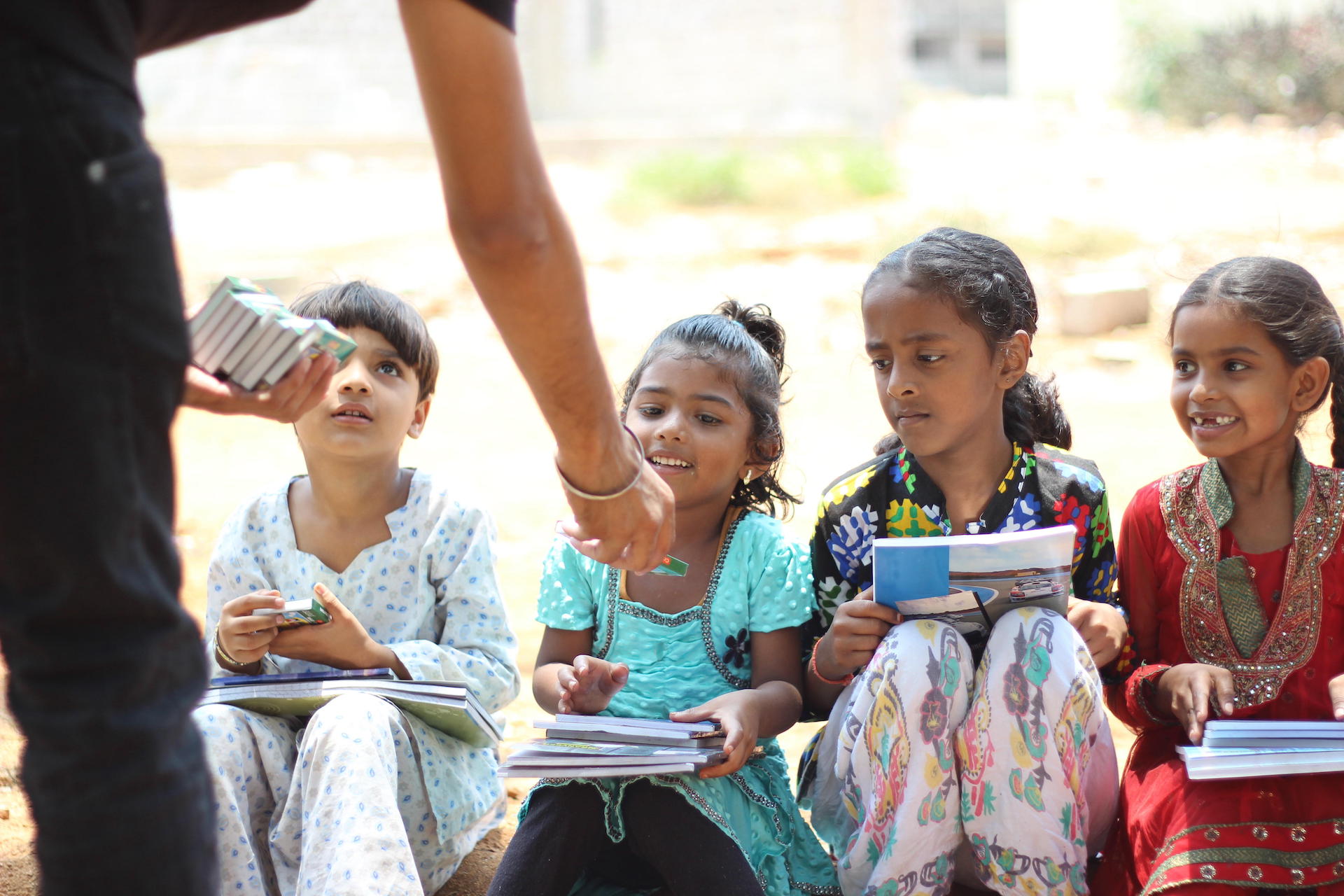In March 2020, as Covid-19 began to spread across India, the government in New Delhi enacted the world’s largest nationwide lockdown. Businesses shuttered, and many low-income families lost their livelihoods overnight. With both the formal and informal economies at a near standstill, many workers fled the cities for their home villages, and the health crisis quickly became a humanitarian crisis as well.
The Akshaya Patra Foundation, a non-governmental organization (NGO) dedicated to eradicating hunger and malnutrition, went into action across India, cumulatively serving over 123 million meals in 49 locations since then. The funding primarily comes from corporate partners including American Tower Corporation, Barclays, Deutsche Bank, Goldman Sachs, LG India, Nestlé India and PepsiCo.
“Grants by corporate partners through CSR programs covered over 95% of the cost of relief efforts, which included the distribution of cooked meals from the foundation’s kitchens, and packed grocery kits,” says foundation CEO Shridhar Venkat.
India became the first country in the world to mandate corporate social responsibility (CSR) spending in 2014. If an Indian company has a net worth of more than INR 500 crore (5 billion rupees, about $68 million), annual revenue of more than INR 1,000 crore ($137 million), or a net profit of more than INR 5 crore ($684,000), the Companies Act requires them to spend 2% of their average annual net profit on programs for social good.
India’s CSR program isn’t about making one-time charitable donations – it has a higher purpose of giving back to the community and creating positive social change. There has been a conscious attempt to keep CSR legislation aligned with India’s commitment to the U.N. Sustainable Development Goals; and since the Companies Act became law, there has been a sea change in how Indian corporations allocate their CSR. The mandate meant companies had to think more proactively about social issues in India and focus their ideas of business responsibility and purpose.
In the second year of the pandemic, India’s Ministry of Corporate Affairs expanded the scope of allowable CSR expenditures to help bolster the medical system. Companies can direct CSR funds towards creating medical oxygen storage plants, manufacturing ventilators and medical equipment, and building other vital health infrastructure. Though it’s still in a critical place, India could have been in a much worse position without CSR, which totalled approximately $2 billion in 2020, with half of that going towards pandemic relief.
Shifting gears
Initially, companies were hesitant at the idea of regulated CSR spending. “During the first few years, companies were coming to terms with the fact that there is a regulation. They had to realign their strategies and begin to think about CSR strategically,” says Priya Naik, CEO of CSR consulting firm Samhita Social Ventures.
Before the law made CSR spending mandatory, companies would engage in one-time event-based activities such as celebrating national holidays or providing free meals. Now the focus has shifted to multi-year projects, says Payal Mulchandani, co-founder of 4th Wheel Social Impact, a CSR consulting firm. In 2014, companies that were already engaging in CSR had to figure out how to align their efforts with the new guidelines, and others that had never thought about it before had to get moving.
The CSR spending law was initially panned by some activists, and it also provides a bit of a philanthropic smokescreen. In most countries, CSR is a voluntary part of responsible business practices — companies choose to participate if they want to be a responsible corporate citizen. With mandatory giving in India, the biggest CSR spenders are not necessarily the most responsible companies, Naik says.
Companies can spend CSR money on any development issues: education, livelihood and skill development, health, rural development or gender equality. Large companies have established foundations or trusts through which they implement CSR programs. Smaller companies might give their CSR funds to government initiatives or NGOs working in the development sector such as the Clean Ganga Fund, Swachh Bharat Kosh (Clean India) or the Prime Minister’s National Relief Fund – or they can contribute to state incubators, state-owned companies or publicly funded universities.
“Recently there has been an increase in multi-organization collaborations, be it corporates with corporates, corporations with government bodies, or impact investors working with others,” Mulchandani says. “Organizations are collaborating to maximize their impact when they work in the same geographies or thematic areas.” One example is The Collaborators, an initiative started by EdelGive Foundation with the state government of Maharashtra that works with numerous nonprofits and funders.
According to reports by advisory and research firm Sattva Consulting, private and public companies spent a total of INR 89,335 crore ($12.2 billion) on CSR between 2014 and 2020. Education, healthcare and rural development projects were the top three targets for CSR money.
CSR spending in India
Source: India’s Ministry of Corporate Affairs
The biggest targets of CSR spending
Source: India’s Ministry of Corporate Affairs
At first, companies were mostly giving their CSR money to credible, large NGOs. “In the last few years, we have seen a willingness to partner with social enterprises, accelerators and incubators, not just nonprofits,” says Naik. “We have seen a lot more government engagement in co-creating CSR initiatives.”
She points out that state-owned enterprises are especially likely to support government programs such as Swachh Bharat or Atmanirbhar Bharat (Self-reliant India) or the Aspirational Districts Program.
CSR has changed companies
In the seven years since the CSR spending mandate, Indian companies have embraced it. Corporate Social Responsibility spending is no longer just about writing a check, but participating in a conversation around a company’s role in society and how their money can create change.
“When I talk to CXOs or board members, I consistently hear that the regulation has changed boardroom conversations,” Naik says. “Earlier it was just about profits, sales and growth, but now you have the board and the senior leadership sitting down and discussing things that are of importance to the company’s communities and social governance at large. In some sense, it brought in this element of humanity and purpose into boardroom conversations.”
CSR has brought in this element of humanity and purpose into boardroom conversations.
About 50% of all CSR spending still happens in collaboration with NGOs, primarily large ones, according to Sattva Consulting. Large foundations, both national, such as Tata Trusts, and international, such as the Gates Foundation, are placing an emphasis on developing and maturing private sector involvement, Naik says. “This includes helping these sectors and the stakeholders build capacity and lead impact-focused initiatives, inculcate better monitoring and reporting standards, access global best practices, undertake long-term commitments and implement innovative initiatives.”
“We are also seeing more acceptance of innovation, especially in finance. That’s why we were able to successfully launch and address the livelihood crisis brought on by Covid-19, with a blended finance facility called REVIVE,” Naik says.
The program Samhita Social Ventures created leverages CSR and philanthropic funding to provide capital, skills training and social security to informal workers and micro-enterprises, with a focus on women and youth. Since October 2020, REVIVE has reached 39,000 of its initial 100,000 target, supporting people with small beauty businesses or neighborhood stores, street vendors, carpenters and sanitation workers. It was only possible with support from a wide variety of international and regional NGOs and corporate partners.
CSR in the time of Covid-19
In March last year, the Ministry of Corporate Affairs announced that funds spent on Covid-19 initiatives would count towards companies’ CSR activity. As India is dealing with a deadly second wave, the government hopes increased corporate involvement will help tackle the pandemic.
How CSR is allocated in 2021
Source: India’s Ministry of Corporate Affairs
The total CSR budget for 2021 is estimated at about INR 15,000 crore ($2 billion), with more than half dedicated to Covid-19 response programs. That leaves the other half available for other CSR projects, if companies do not make further allocations to pandemic programs.
Usually, about 50% of total CSR budgets are deployed through NGOs as implementation agencies. With half of the entire 2021 CSR pot allocated to Covid-19 relief, it remains to be seen how much of the remaining half will go to regular NGO projects.
“It’s commendable that companies have stepped up to the Covid-19 challenge,” Naik says. However, she adds that CSR can’t be reactive at the cost of other goals. “Funding to other sectors such as education, livelihood recovery, environment, women’s empowerment, all of which are critical, may reduce significantly,” she says.
NGOs rely on long-term planning to survive and successfully implement their plans. The drop in funding to non-pandemic causes has disrupted strategies for other important issues, such as fighting tuberculosis or workforce training. “NGOs working in these sectors have had to pause implementation of these programs,” Naik says. “Last year, many NGOs had to close up shop or lay off employees.” This left communities with gaps in much-needed services.
But everyone hopes the additional financial power to fight Covid-19 will hasten the pandemic’s end. “Many companies during the pandemic were able to help communities around them through making medical care and equipment available, providing essential supplies and more,” says Vrunda Bansode, head of data insights for Sattva Consulting. “CSR provides a legally compliant way of accounting for those expenses, making it easier for companies to extend a helping hand.”
Read more
Sign up to keep up to date with ReThink Q.







